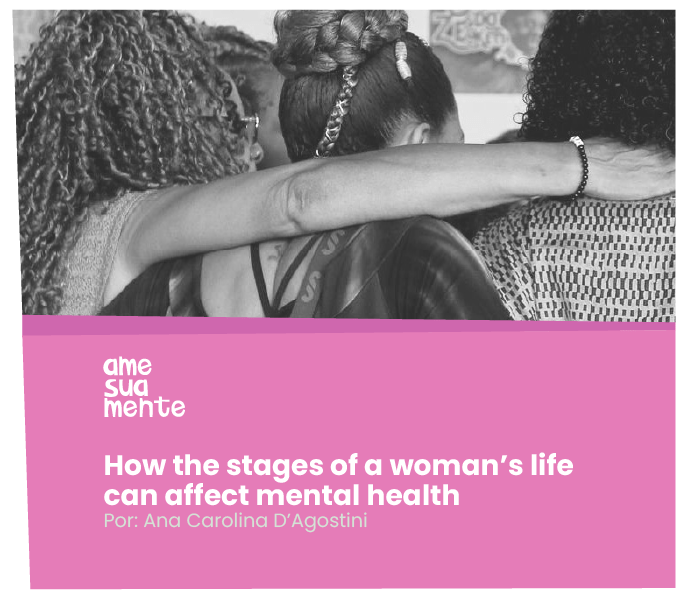
Nexo Jornal – 05.08.2023
Care permeates different spheres of social life and is (or should be) a collective issue
One of the most prominent issues currently under debate is mental health. Data from the World Health Organization indicate that around one in four people will develop a mental disorder in their lifetime. Looking more closely at these data, women are more affected than men, with one in five experiencing some mental disorder during their lifetime, compared to one in eight men.
Talking about women’s mental health is a complex topic. There are several factors that can impact a woman’s behavior, thoughts, and feelings, such as race, genetic and socioeconomic factors, traumatic experiences, and the availability of a support network.
However, despite so many nuances, there are many shared themes when we talk about mental health that extend across all stages of development.
During adolescence, although excessive concern over body image affects both boys and girls, research indicates that girls are almost twice as concerned about their appearance as boys. Issues with body image, if untreated, can evolve into eating disorders and can be an indication of intense mental suffering that causes harm, such as avoiding physical activity and social events. Body dissatisfaction often results from the internalization of ìidealî bodies commonly displayed on social media and has been linked to symptoms of depression and eating and other disorders, such as social anxiety and panic.
In adult life, the mental disorder that women mostly face is depression, whose main symptoms are significant changes in sleep and eating habits, loss of pleasure in activities that used to be satisfying, and mood swings. We may wonder about the difficulty of making such a diagnosis in men due to the fact that this population seeks less help when it comes to talking about feelings and facing the stigma of being ìfragile.î However, the rate of women diagnosed with the condition is double that of men.
In old age, there has been much discussion on the impact of ageism on mental health, which is prejudice and discrimination based on age, especially against women, who suffer greater aesthetic pressure. Being part of a stigmatized population can result in a series of negative experiences that can generate high stress and, once again, potentiate cases of depression and anxiety.
DESPITE THE NUANCES, THERE ARE MANY SHARED THEMES WHEN WE TALK ABOUT MENTAL HEALTH THAT EXTEND THROUGHOUT ALL STAGES OF DEVELOPMENT
As important as talking about suffering and mental disorders is talking about promotion and prevention. After all, mental disorders do not start ìout of nowhereî and can be prevented. However, this should not be a solitary task. Care for women’s mental health permeates different spheres of social life and is (or should be) a collective issue. Care begins and is present in the words we use when talking about a woman’s appearance, in guaranteeing equal work opportunities, in not blaming women for the violence they suffer, and in guaranteeing respect and safety. It is also present in representations across different media. Caring also means fighting stigmas when we talk about mental health, after all, saying that depression or anxiety are cool or crazy only deters the search for help and sometimes makes the more serious cases invisible.
We invite you to reflect on topics that impact women’s mental health. “Being a woman” is also a social construct, and everything that was once historically conceived can be revisited and reconstructed in healthier and more coherent ways. These are important reasons to fight and celebrate.
*This article addresses some differences between men and women. Not every gender identity fits into one of these categories, and this article does not exclude or disregard the validity and experiences of those who identify with other genders.
Ana Carolina C D’Agostini is a psychologist and pedagogue, Training Coordinator at Instituto Ame sua Mente, and Content Manager at Semente Educação.










